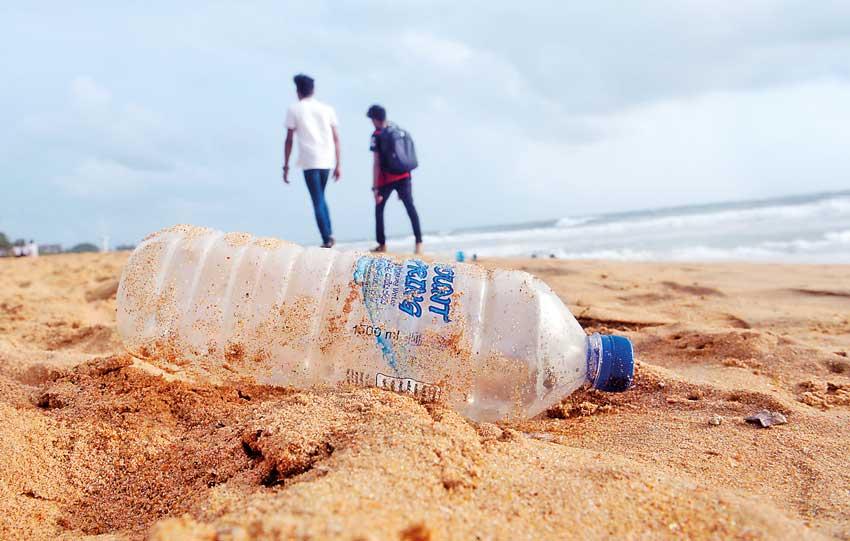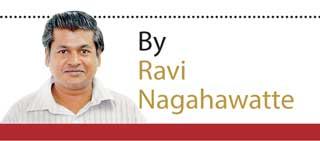01 Apr 2021 - {{hitsCtrl.values.hits}}

Sri Lanka from being a disciplined nation has moved towards becoming a country which doesn’t fear laws and regulations (AFP)
When we analyse what’s happening in social media circles there is confusion as to how to lead a righteous life. The law of the country must supercede all faiths
This is what’s happening in Sri Lanka regarding deforestation incidents in lands close to Sinharaja. There are so much lies out there; more than the number of trees that have been felled
When one walks along the sands of time historic records reveal that the Ceylonese of yonder were a well-behaved and cultured society
 The general breakdown of law and order in the country is of great concern. Days ago we witnessed the beating up of a lorry driver by a law enforcement officer; all in broad daylight. The reason for the assault was the lorry driver knocking down another policeman who was on duty, on the road, close by.
The general breakdown of law and order in the country is of great concern. Days ago we witnessed the beating up of a lorry driver by a law enforcement officer; all in broad daylight. The reason for the assault was the lorry driver knocking down another policeman who was on duty, on the road, close by.
The video footage of the incident went viral on social media and some comments made by Facebook (FB) users clearly distort facts regarding the application of the law. FB users were quick to state that a civilian can defend him/herself in the face of an attack by a policeman. But the police spokesperson was quoted in national newspapers stating that a civilian can defend him/herself only if there is threat to ones life.
When we analyse what’s happening in social media circles there is confusion as to how to lead a righteous life. The law of the country must supercede all faiths. But so many individuals with political clout have been acquitted of charges against them in court cases. At the same time individuals in the opposite camp have been hunted and the law has been applied in full force. The rules and regulations specified to deal with the COVID -19 pandemic are not followed despite most state institutes, including the one that handles public transport, being militarised by this government.
 There was one such post regarding the Sinharaja issue where a person was harsh on the much talked about nature lover Baghya Abeyratne. But there was a group of individuals who later made a claim that the person who made the harsh comments was maintaining a false FB account. Efforts made by nature lovers to save the forests are negatively impacted when such bogus posts are made
There was one such post regarding the Sinharaja issue where a person was harsh on the much talked about nature lover Baghya Abeyratne. But there was a group of individuals who later made a claim that the person who made the harsh comments was maintaining a false FB account. Efforts made by nature lovers to save the forests are negatively impacted when such bogus posts are made
We see how bus operators are overloading passengers and not even maintaining hand sanitizer and a book to jot down names and addresses of commuters.
The page one of newspapers highlight the wrong doings of laymen and also the questionable conduct of lawmakers. If one thought that the alleged Central Bank Bond issue was the mother of all financial frauds this regime produced the loss of income to the government by reducing import tax on sugar.
And when the court verdicts drag and contribute to delays social media users are quick to form opinion. James Callaghan has been quoted in the book ‘the cult of the amateur’ saying, “A lie can make its way around the world before the truth has the chance to put its boots on’.
This is what’s happening in Sri Lanka regarding deforestation incidents in lands close to Sinharaja. There are so much lies out there; more than the number of trees that have been felled. There is also little or no verifying of facts before posts are made on Facebook. There was one such post regarding the Sinharaja issue where a person was harsh on the much talked about nature lover Baghya Abeyratne. But there was a group of individuals who later made a claim that the person who made the harsh comments was maintaining a false FB account. Efforts made by nature lovers to save the forests are negatively impacted when such bogus posts are made.
 The book mentions that the first set of Justices of the Peace was appointed between 1802-1804. But the writer affirms that after the year 1977 people unsuitable for the post of ‘Justice of the Peace’ were appointed. Much of these were appointments made by politicians of the UNP Government in return for favours
The book mentions that the first set of Justices of the Peace was appointed between 1802-1804. But the writer affirms that after the year 1977 people unsuitable for the post of ‘Justice of the Peace’ were appointed. Much of these were appointments made by politicians of the UNP Government in return for favours
Now the truth circulating regarding the coconut oil that’s being used in Sri Lanka is that its not healthy. Claims are being made that the coconut oil sold to consumers may contain an unhealthy carcinogenic agent called aflatoxin. This news is really going to affect upcoming avurudu (New Year) celebrations. The frying of oil cakes (Kevum) has been put aside till the authorities sort out this coconut oil issue.
From money laundering to exporting heroin and ladies committing suicide because they can’t settle micro finance loans make borrowers be in two minds about whether to obtain a loan, use the ATM machine at banks (due to hacking) and be involved in fishing because the boats that carry the catch might be transporting illegal weapons and narcotics.
It’s in this context that we must turn back the clock and trace the roots of these notorious Sri Lankans and see why they have turned to this state of living. When one walks along the sands of time historic records reveal that the Ceylonese of yonder were a well-behaved and cultured society.
Deshakeerthi J Ranaweera in his book on the history of ‘The Justices of the Peace’ in Sri Lanka reveals that the Ceylonese at the time of British rule were a disciplined lot. He writes, “In 1865 in the month of June as many as 25,000 Buddhists had gathered in Anuradhapura to attend to a four-day Vesak celebration. The British Government appointed Government Agent in Sri Lanka had written to the England authorities stating how well-behaved the devotees at the gathering were. He had added that he didn’t have to use police force to control the crowd at any time. These devotees had ensured that the place was clean when they left. There had been a temple close by. The temple’s donation till contained 4000 silver coins and no one showed any interest to steal this money”. Going beyond this letter in Ranaweera’s book its literature also brings us information about the origins of the appointments of Justices of the Peace in Sri Lanka. The book mentions that the first set of Justices of the Peace was appointed between 1802-1804. But the writer affirms that after the year 1977 people unsuitable for the post of ‘Justice of the Peace’ were appointed. Much of these were appointments made by politicians of the UNP Government in return for favours.
The President of this country appeared on national television recently and said that this is not an era where there are kings in this island and Maharajas existed in India and not in Sri Lanka. But during the ancient past the kings of ancient Ceylon appointed representatives to ensure law and order in the country. That system produced a disciplined society. But the creating of a parliament system and the adopting of the British Law gave all people of the country a level playing field which also opened the doors for unscrupulous individuals to assume political power.
The parliamentary system, over the years, produced a method of applying the law in one way to those who walk the corridors of power and another way to those individuals who choose the truth over what’s false and wish to have a righteous society. The decline of discipline and the breakdown of a righteous society might have happened once the ‘Greens’ came to power.
29 Nov 2024 2 hours ago
29 Nov 2024 3 hours ago
29 Nov 2024 4 hours ago
29 Nov 2024 5 hours ago
29 Nov 2024 5 hours ago